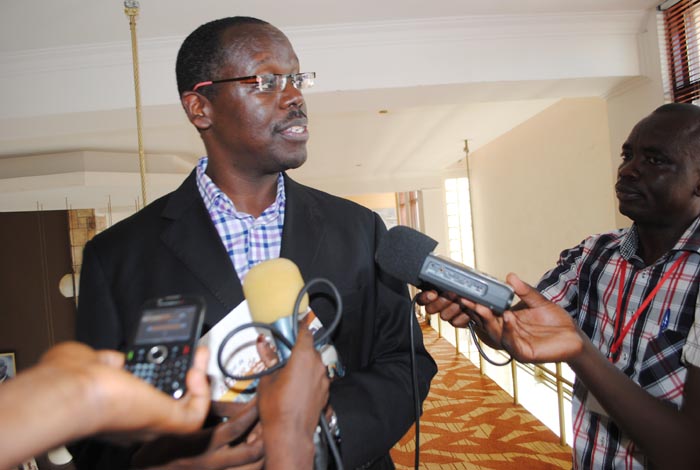The state of East Africa Report 2013 shows that there is a remarkable inequality between people in EAC despite the cherished motto of the community “One people, one destiny”.-By Yves Didier Irakoze

Aidan Eyakuze: “People have to know that the process of integration is an opportunity to enlarge the market, exchange, share problems, discuss, find the solutions and reduce this inequality together.”©Iwacu
The recent population’s census shows that the populations in Kenya, Rwanda and Tanzania are about184 million inhabitants. In 2030, there will be an increase of 100 million. Thus, it is urgent to improve the living conditions through developing the economy and facing all challenges in order to achieve the East African Community federation process. It’s high time all the EAC countries stood up and fought together for the best solution. According to the survey, Rwanda is the country where inequality is the most visible in EAC while in Burundi it is less visible. Aidan Eyakuze, Associate Regional Director of Society for International Development explains that the reason for this inequality is the fast economic evolution. He gives the example of Burundi where the agriculture is no longer sustainable rather than services as people tend to change from agriculture to the sector of services. Another reason is malnutrition. All the East African countries have malnourished children. This is a handicap for the development of our countries. Another obstacle is the growth of the population which doesn’t match with the revenue. The last reason is the quality of education and training provided to our children regardless of the time. In fact, according to him the education is outdated rather than being updated. “In Tanzania, teachers do not go to work and if they go, the time of teaching is very small. Consequently, the results will be worse and the quality of knowledge given to students doesn’t allow them to be competent and competitive enough on the job markets, » deplores Eyakuze.
What could be done?
“It’s the whole system that causes this inequality like the badly- structured economic system, the political system based on dictatorship, the system of revenue and goods distribution, as well as an inappropriate system of health, education, tax policy, etc. So, we have to change our leaders’ mentality so that they can be aware of the danger of inequality in the society,” states Eyakuze. He goes on saying that people are afraid of that EAC federation process because of inequality. Some countries are still hesitating to adhere to the federation system as they are not sure of their development. “People have to know that the process of integration is an opportunity to enlarge the market, exchange, share problems, discuss, find the solutions and reduce this inequality together,” he points out. He puts forward that what is needed for the country members is to reinforce their local economies, rise up the added values and multiply resources. Participants during the presentation of the report propose that measure should be taken like harmonizing laws, attracting investors, adopting strong decentralization and training youths in entrepreneurship and revenue generating activities. “It is also important to fund the federal stock exchange and involve the Diasporas. Lastly, invest in infrastructure like energy, telecommunication and education and set up an East African Board to plan projects,” conclude participants.














 IWACU Open Data
IWACU Open Data

